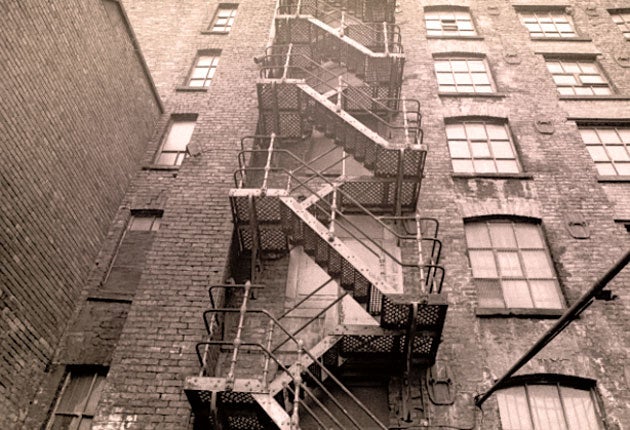Get in line for industrial-strength theatre
Murrays' Mills in Manchester is the perfect setting for an immersive take on Dickens's bleak, grimy Hard Times, says Paul Vallely

Your support helps us to tell the story
From reproductive rights to climate change to Big Tech, The Independent is on the ground when the story is developing. Whether it's investigating the financials of Elon Musk's pro-Trump PAC or producing our latest documentary, 'The A Word', which shines a light on the American women fighting for reproductive rights, we know how important it is to parse out the facts from the messaging.
At such a critical moment in US history, we need reporters on the ground. Your donation allows us to keep sending journalists to speak to both sides of the story.
The Independent is trusted by Americans across the entire political spectrum. And unlike many other quality news outlets, we choose not to lock Americans out of our reporting and analysis with paywalls. We believe quality journalism should be available to everyone, paid for by those who can afford it.
Your support makes all the difference.There is something claustrophobic about the long, low gallery at the heart of Murrays' Mills in Great Ancoats. It is not far from the stylish urban refit that is the eastern quarter of modern Manchester. But it feels a century away from all the upmarket warehouse loft conversions only streets away.
It is apt that this place, where recession halted the tide of redevelopment, has been chosen as the venue for what promises to be a memorable stage adaptation of Charles Dickens's grim industrial novel Hard Times. The medium will become the message as the audience are promenaded through the mill to encounter the different episodes in Dickens's grotesque and scathing indictment of a world in which the higher things in life are sacrificed on the altar of economic necessity. As savage cuts in public spending loom, it is a world which now seems nearer than it has for decades.
The play's director, Chris Honer, walked me through the mill, which is littered with the odd bit of old machinery, broken wheels and great textile hampers – remnants of the days when the building was the pride of Adam Murray, the great Victorian spinner of fine yarn, in what was amongst the world's earliest steam-powered cotton factories. It will not be hard for audiences to feel themselves immersed in the grimy, backbreaking, primitive prosperity of Dickens's Coketown. The low ceiling will only add to the sense of oppression.
Honer is director of Manchester's Library Theatre, which is homeless for four years while it waits for its new home to be built after being evicted from the city's Central Library last year. "It's prompted us to look at making drama in places that don't normally have theatre," he says.
The audience will arrive at the mill to a living tableau of Dickensian Britain, beginning with performers from the circus, whose seedy exuberance is the catalyst for much of the questioning of the utilitarian ethic which brought industrial success to Victorian Britain at such a human cost. From there they will walk along the long gallery, through the school of the hardline educationalist Thomas Gradgrind, the factory of the self-satisfied businessman Josiah Bounderby and the slum tenements of the down-trodden loom-workers in a cross-section of a 19th-century mill town.
Hard Times is a bleak novel, even if imagination and love – qualities alien to the bullying Gradgrind – do have a triumph of sorts. It is a tale that will resonate with a contemporary audience for its drudge hero, Stephen Blackpool, an extraordinarily decent man who is fundamentally a victim of the economic and social circumstances in which he finds himself trapped.
They will recognise, too, Dickens's cartoon-like grotesques such as lickspittle clerk Bitzer, whose every action is calculated for material gain, the emotionally illiterate Mrs Gradgrind, who memorably says "I think there's a pain somewhere in the room, but I couldn't positively say that I have got it", and the union demagogue Slackbridge. "Dickens's attitude to organised labour is problematic," observes Honer wryly. But most of the story is inescapably contemporary, so much so, the director adds, that there is no need to point up parallels by having the wealthy, callow young London gentleman James Harthouse played as though he were George Osborne.
The new dramatisation by Charles Way places a more modern emphasis on the resilience of the women which forms the background to the novel, but otherwise, says Honer, the play will lead the promenading audience on "a compelling journey through damaged childhoods, overbearing businessmen, circus wonders, forbidden romance, industrial strife and redemptive love."
The production will feature music by Colin Sell, the resident pianist on Radio 4's I'm Sorry, I Haven't a Clue, and a supporting cast of local people as extras, including one who worked at Murrays' Mills in its heyday.
'Hard Times', Murrays' Mills, Manchester (www.librarytheatre.com) 8 June to 2 July
Join our commenting forum
Join thought-provoking conversations, follow other Independent readers and see their replies
Comments